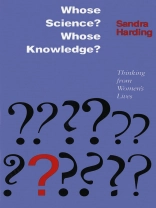Sandra Harding here develops further the themes first addressed in her widely influential book, The Science Question in Feminism, and conducts a compelling analysis of feminist theories on the philosophical problem of how we know what we know.Following a strong narrative line, Harding sets out her arguments in highly readable prose. In Part 1, she discusses issues that will interest anyone concerned with the social bases of scientific knowledge. In Part 2, she modifies some of her views and then pursues the many issues raised by the feminist position which holds that women’s social experience provides a unique vantage point for discovering masculine bias and and questioning conventional claims about nature and social life. In Part 3, Harding looks at the insights that people of color, male feminists, lesbians, and others can bring to these controversies, and concludes by outlining a feminist approach to science in which these insights are central. ‘Women and men cannot understand or explain the world we live in or the real choices we have, ‘ she writes, ‘as long as the sciences describe and explain the world primarily from the perspectives of the lives of the dominant groups.’Harding’s is a richly informed, radical voice that boldly confronts issues of crucial importance to the future of many academic disciplines. Her book will amply reward readers looking to achieve a more fruitful understanding of the relations between feminism, science, and social life.
लेखक के बारे में
Sandra Harding is Professor of Social Sciences and Comparative Education at the University of California at Los Angeles. She is also Director of the UCLA Center for the Study of Women.












